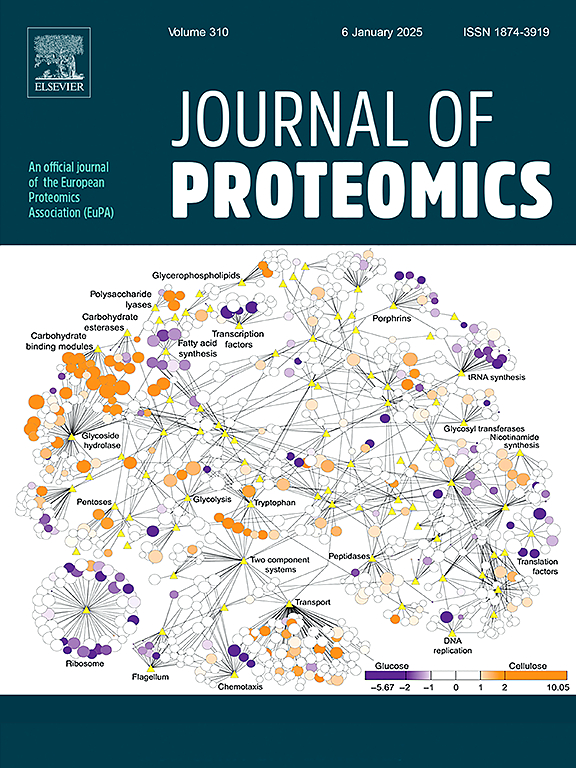Collecting and analysing pig mucosal scraping samples for mass spectrometry-based proteomics: A study on factors causing variation in proteomic data
IF 2.8
2区 生物学
Q2 BIOCHEMICAL RESEARCH METHODS
引用次数: 0
Abstract
In this study, we evaluated the effects of experimenter handling and batch effects on proteomic analyses of mucosal scrapings in pigs. We analyzed mucosal samples from twelve piglets that were fed two distinct diets. Mucosal samples were obtained from a 60 cm segment collected from the jejunum, which was divided into six equal segments. Scrapings were collected by two experimenters, who each handled three of the six segments per pig. Both experimenters were given the exact same instructions for performing the mucosal scrapings. Samples were then randomized and processed in two separate groups on different days to examine batch effects. Protein extraction and digestion was carried out using Midi S-Traps (ProtiFi) and peptides were analyzed by DIA-MS. Data processing and statistical analysis were performed using DIA-NN and RStudio. Our analyses revealed no significant experimenter effects, but we observed small batch effects across datasets. Our findings emphasize the importance of standardized protocols to minimize experimenter-induced variability and the necessity of correcting for batch effects during data analysis. Our study provides a framework for minimizing unwanted variability in future proteomic studies, ensuring more reliable and reproducible findings.
Significance
With this study, we aimed to contribute to the improvement of the reliability and reproducibility of proteomic analyses in intestinal mucosal research. By systematically evaluating the effects of experimenter handling and batch processing on mucosal scraping samples, the study highlights key sources of variability that can influence proteomic outcomes. While experimenter effects were minimal, the identification of batch effects underscores the necessity of standardized protocols and appropriate corrections during data analysis. These findings provide a framework for minimizing unwanted variability in future studies, ultimately enhancing the accuracy of proteomic data interpretation and advancing research in intestinal health and disease.

收集和分析基于质谱的蛋白质组学的猪粘膜刮拭样品:蛋白质组学数据变化的因素研究
在这项研究中,我们评估了实验者处理和批次效应对猪粘膜刮痕蛋白质组学分析的影响。我们分析了12头饲喂两种不同日粮的仔猪的粘膜样本。取空肠60 cm段黏膜标本,将其等分6段。刮痧由两名实验人员收集,他们每人处理每头猪六个部分中的三个。两位实验者在进行粘膜刮擦时都得到了完全相同的指示。然后将样本随机分成两组,在不同的日子进行处理,以检验批次效应。采用Midi S-Traps (ProtiFi)进行蛋白质提取和酶切,采用DIA-MS进行肽段分析。使用DIA-NN和RStudio对数据进行处理和统计分析。我们的分析显示没有明显的实验者效应,但我们观察到数据集的小批量效应。我们的研究结果强调了标准化方案的重要性,以尽量减少实验者引起的变异性,以及在数据分析过程中纠正批次效应的必要性。我们的研究为减少未来蛋白质组学研究中不必要的变异性提供了一个框架,确保更可靠和可重复的发现。通过本研究,我们旨在提高肠粘膜研究中蛋白质组学分析的可靠性和可重复性。通过系统地评估实验者处理和批量处理对粘膜刮擦样品的影响,该研究强调了影响蛋白质组学结果的变异性的关键来源。虽然实验者的影响很小,但批效应的识别强调了在数据分析过程中标准化协议和适当纠正的必要性。这些发现为在未来的研究中尽量减少不必要的变异提供了一个框架,最终提高了蛋白质组学数据解释的准确性,并推进了肠道健康和疾病的研究。
本文章由计算机程序翻译,如有差异,请以英文原文为准。
求助全文
约1分钟内获得全文
求助全文
来源期刊

Journal of proteomics
生物-生化研究方法
CiteScore
7.10
自引率
3.00%
发文量
227
审稿时长
73 days
期刊介绍:
Journal of Proteomics is aimed at protein scientists and analytical chemists in the field of proteomics, biomarker discovery, protein analytics, plant proteomics, microbial and animal proteomics, human studies, tissue imaging by mass spectrometry, non-conventional and non-model organism proteomics, and protein bioinformatics. The journal welcomes papers in new and upcoming areas such as metabolomics, genomics, systems biology, toxicogenomics, pharmacoproteomics.
Journal of Proteomics unifies both fundamental scientists and clinicians, and includes translational research. Suggestions for reviews, webinars and thematic issues are welcome.
 求助内容:
求助内容: 应助结果提醒方式:
应助结果提醒方式:


